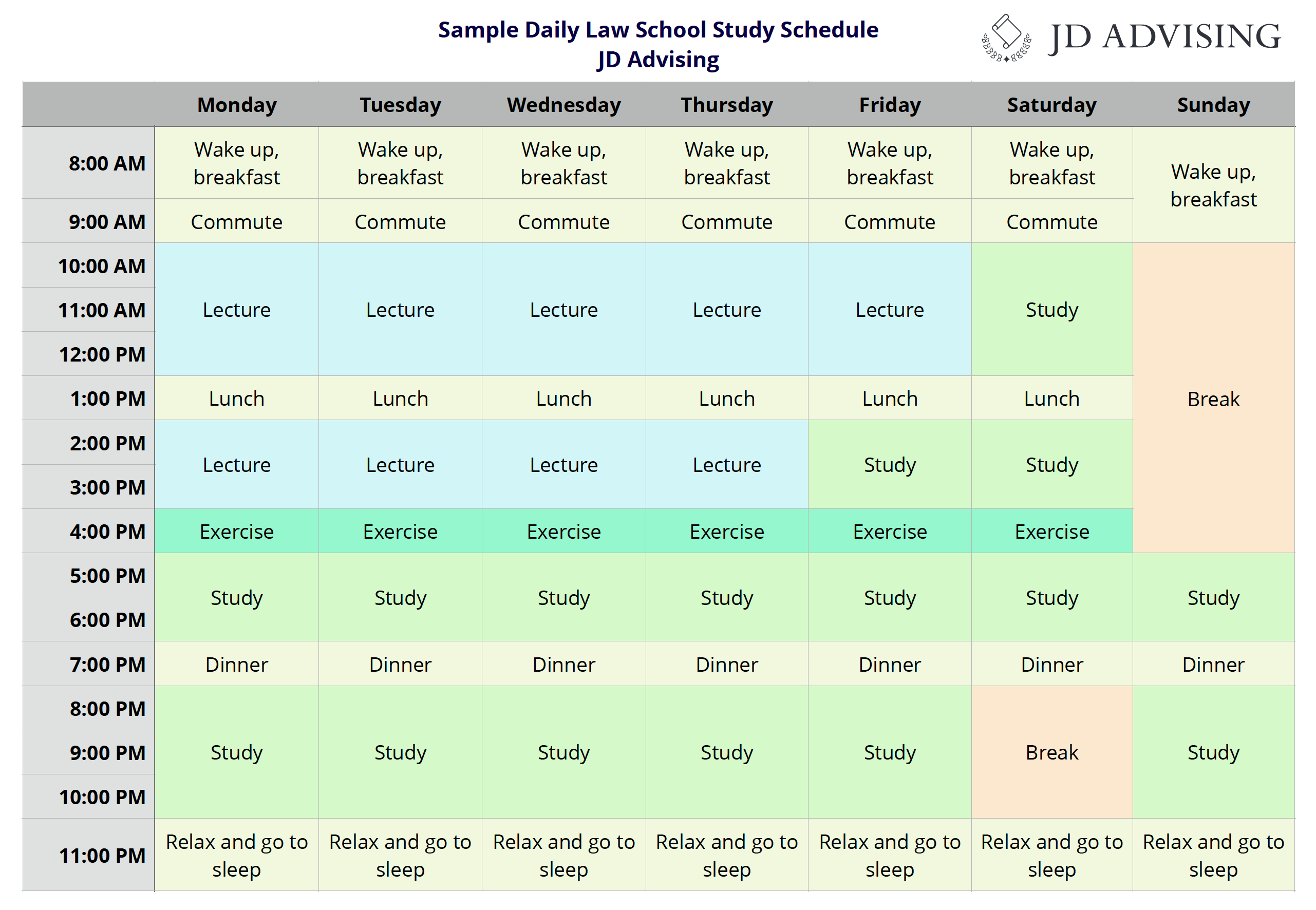What should my weekly law school study schedule look like?
What should my weekly law school study schedule look like?
A good law school study schedule can make a big difference in your grades. A good study schedule can also save you stress, give you a sense of control and lower your anxiety during law school. If you are looking for a way to improve your law school grades and lower your stress level, consider creating and following a hand-crafted study routine.
Note: if you haven’t yet downloaded our free guide on how to succeed in law school, do so here!
Even better, join our FREE law school prep course here! We discuss how to create a study schedule in great detail!
How to craft the perfect law school study schedule
There are two steps necessary to plan your ideal study routine: First, before your semester starts, choose when and where you will study. Second, each week of the law school semester, plan what you will study.
Step one: before the semester starts, choose when and where you will study
You can complete step one as soon as you have your class schedule. The best way to do this is to have a blank weekly calendar in front of you with all seven days of the week on it. Make sure that you have a lot of space to write under each day. It helps if you divide your time into half-hour increments. Start from the time you wake up until the time you go to bed.
After you have your blank weekly schedule in front of you, complete the following steps:
1. Fill in the days and times that you have classes with one color
It is important to go to every class in law school!
 2. Fill in your daily obligations and tasks. Some necessary tasks might include:
2. Fill in your daily obligations and tasks. Some necessary tasks might include:
- Getting ready in the morning
- Eating breakfast, lunch, and dinner, and taking breaks
- Commuting to/from school
You should also include:
- Time to do something you enjoy and/or to spend with friends
- Any other commitments (e.g., religious or family commitments)
- Meeting with a study group (if you benefit from studying in a group)
- A break for a few hours, a half-day, etc.
3. Plan time for sleep and exercise
- Make sure to schedule 6–8 hours of sleep per night.
- Plan time to be active—whether it’s going to the gym or going on a walk. It is good for your body and your brain. It will also help to relieve stress. We recommend planning to exercise at least five days a week, even if only for a short time.
4. Decide when and where you will study
- Consider whether you are a morning person or a night person. If you cannot bear the thought of getting up early, schedule your study sessions for the afternoon and evening.
- Consider the best environment to study in: Is it at home, a library, or a coffee shop? Be true to yourself. If you really cannot concentrate in the law library, don’t go to the library to study simply because you feel you should.
- Make sure you are studying for the optimal amount of time.
- Study for at least one-hour chunks at a time. Aim to study several hours each day.
- Take breaks if you are studying for a long period of time.
An example of a law school study schedule might look like this:
The above schedule is for someone who studies best in the afternoon and evening, rather than in the morning. The schedule allocates about several hours per day to studying. Your study schedule may look completely different.
Now that you know when you will study, it will be automatically programmed in your day! So, how do you know where to begin when you sit down to study?
Step two: once you start your semester, plan your daily to-do list each week
Sit down once a week for an hour or so and prepare a to-do list for each day. The list should contain everything that you want to get done each day for the whole week. It is best to incorporate planning your weekly to-do list right into your study schedule, ideally at the beginning of the week (Sunday or Monday). This will make it easy to sit down and study because you will have a plan in place. Rather than just saying, “I am going to study for two hours,” you will have an actual checklist of things to do.
When you are making your list of things to do, be as specific as you can. Here are some tasks that you should include in your list.
- Go to class
- Develop your outlines
- Review your outlines
- Practice exams
- Work on legal writing assignment
- Prepare for class
- Other: do something you enjoy, exercise
By automatically programming studying into your day, you will be sure you are studying enough. By making to-do lists, you will know what to do when you sit down to study and you will minimize the risk of not getting everything done or becoming distracted. We discuss creating a daily to-do list more next.
Go to the next topic, What is an example of a daily law school study schedule checklist?
Seeking Success in Law School?
- Benefit from personalized one-on-one tutoring by our seasoned law school tutors.
- Explore our NEW and highly acclaimed law school study aids, available for a free trial.







Leave a Reply
Want to join the discussion?Feel free to contribute!